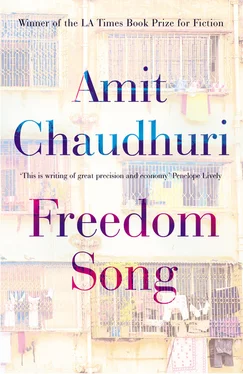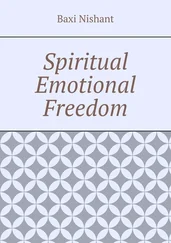For a few days, they — Bhaskar’s relatives — had been waiting to see if Bhaskar, upon getting married, would gradually relinquish his commitment to the Party and take up a more respectable form of existence. The Party was spoken of as an illicit but persistent liaison.
‘But I don’t think Sandhya will allow him to continue for long.’
Someone else said: ‘She’s a hard-headed sensible girl after all.’
‘Let us see.’
They waited. But married life and its responsibilities seemed to leave Bhaskar unchanged. He was still selling Ganashakti; and, even now, he would, vociferously if necessary, and for as long as he could, marshalling an array of facts and arguments, criticize the new and sinister global order, the present government that was governing shamelessly from the centre, illegal bargains between nations and business houses, and every relative, cousin, or uncle who happened to disagree with him.
CRPF soldiers; three months ago, and before then, they’d appeared when the roads were silent, waiting for riots to break out in the city though they eventually hadn’t. Sleepy-eyed, waving at the children. As if they were passing through, a peacekeeping force on their way elsewhere.
And yesterday, going through Ballygunge and Park Circus, a truckload that not everyone noticed. These sleepy, sometimes smiling men. Although they were so still now, they could be cruel. Waiting patiently in the traffic jam like the others, their job probably long done. .
They — Bhaskar and the wife he hardly knew — made preparations for the journey, preparations to be absent from the house for five days. From responsibilities and business partners, parents and parents-in-law, the meetings in the evening, they decided to take a train to Siliguri, and from there a bus to Darjeeling. People had taken the route many times before and many had it by heart; it was like a well-known line of poetry.
They passed roads that had been made by the British, connecting Bengal to the rest of the country, and which were still more or less unchanged, passing the dirty ponds and warm villages of Bengal, hungry children and women with their heads lowered, bulls sunning themselves; INDIA IS GREAT said the message that disappeared between two places; Bhaskar saw these things as a husband and a holiday-maker rather than one who’d become involved in the struggle; they were accompanied in the train by a Bengali family, by old women, and children with colds; they had with them two suitcases, a flask, and a tiffin carrier.
Street-theatre, old forlorn papers: rummaging upstairs for something else, Bhaskar’s mother discovered, grown damp with moisture, photocopied manuscripts among a heap of discarded desiderata and wondered what they were.
‘When he’s back,’ she said when two days had passed, ‘I want him to see the doctor again.’
‘Why? Does he still have that backache?’ asked Bhola.
‘I think so. It’s the way he bends at times. He does it slowly and hesitantly, as if it’s a luxury.’
And Khuku lay on her bed in the afternoon. Although her eyes were closed, she was wide awake, she could hear Nando quarrelling, and she wondered if it was good for Shib to be in that office in this heat at this age: she didn’t like it. Outside, in the blank heat, the sun pulsed like a star that could not be seen.
Oh, men must work; nothing else makes them as happy. But she lay there, cross, unable to sleep.
There was movement in the clouds outside, and lightning; it stirred the air. Shib came back to her as he used to be when he was a boy, when he visited their home so often that she was hardly aware of him, but unaware of him in a different way from her unawareness of him now; a different way of taking someone’s presence for granted. How like a ghost that boy was, both in his paleness and in the strangeness his memory had assumed. He was her brother Pulu’s best friend, a boy whose quietness was deceptive because he noticed more than he appeared to. He was wavy-haired, as he was now, and used to be unusually fair-skinned, more so then than he was at present. He had no mother; she had died when he was two years old, and he’d never had any memory of her. He used to be shy when he came to their house, and her own mother had a special fondness for him because he was motherless and an only child. Thus there was that lost quality about him, even though he belonged to one of the most well-to-do families in the town.
Unanswerable, obsolete questions glimmered in the flashes of lightning. What would have happened to Khuku if Shib had not married her? After school, Khuku’s family had stopped her college education because they said they could not afford it; it was probably true. ‘But Khuku was never interested in schoolwork anyway,’ her brother said in explanation. She had cried for a week, for herself and in forgiveness. A vacancy opened up before her as one kind of life receded from her permanently, the world of exams and preparations and the panic of examination day, now only to be known in other people’s lives. Then she had stayed at home and practised on the harmonium. She had read new novels, and entered into an imaginary world. Characters in stories became as real to her as people; like Khenti who loved pui leaves, and tender-hearted Goshtho didi in Mahasthabir Jatak. Years passed. She read; she waited; she waited silently for some change. She knew, instinctively, she wouldn’t end in the place she’d begun in. They grew up — brothers, sisters, friends; Khuku, Bhola, Shib, Mini, not knowing where they would live, what their children would look like, who their spouses would be, in what way their lives would be different from each other’s, or what incarnation the world would take fifty years from now. At the beginning, they’d moved blindly from birth into the unknown, from darkness into the world; the passage into life, as the one through it, is a journey, and they, unlike the ones who had died in mid-life or as children, had been deemed to complete it, to live out their days in the world.
She hadn’t even realized that Shib thought of her in a particular way. (Shib said that it was her singing that had decided him; and this alarmed her: what if she had not been able to sing?) But Khuku’s elder sister, that stern woman and tender romantic, would always say later, ‘I knew it. When Khuku pinched Shib once, and I saw Shib blush, I knew it.’ Khuku herself had had no idea. When he first proposed to her, in a roundabout way, through her mother, she refused without hesitation. ‘But I don’t think of him in that way!’ she said. ‘He’s more like a brother to me. .’ Her mother had said, ‘Think again. You won’t find another like him.’ But Khuku hesitated; she was certain she was in love with someone else. How intense and chastening these emotions seemed now! On and on one goes, gradually to become a stranger to oneself, but never completely, and never knowing what it is that pushes us in one direction and not another. . And how deeply they believed in romantic love in those days: it was all those long novels. She procrastinated; she neither said no nor yes. Then one day, after she had finished singing a song, she saw a kindness on Shib’s face she had not noticed before; it had always been there, but she had not seen it; it was as if she’d suddenly recognized who he was. Soon after they were engaged, and Shib went to England; and, after six years, she followed him there. It was a few years after Independence; Shib’s father had died; he knew he would never return home. Their marriage was thus a marriage of childhood acquaintances, of two people who had known each other when they had hardly mattered to one another and who had grown one day into their shared life without hardly being aware of it; only slightly embarrassed when that awareness came. And their new life, under some nameless star, began with each other.
Читать дальше












